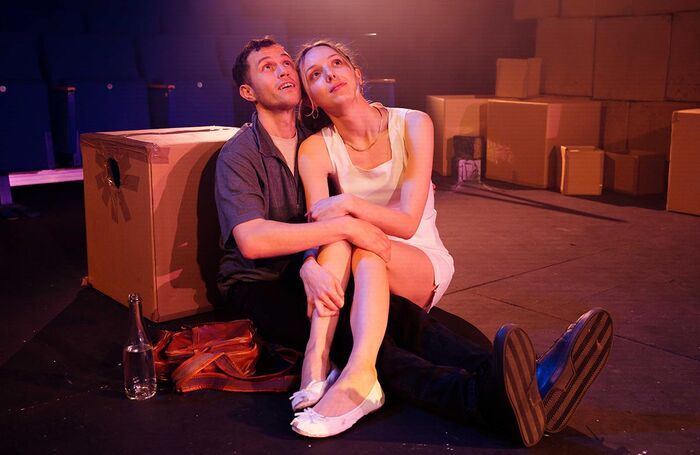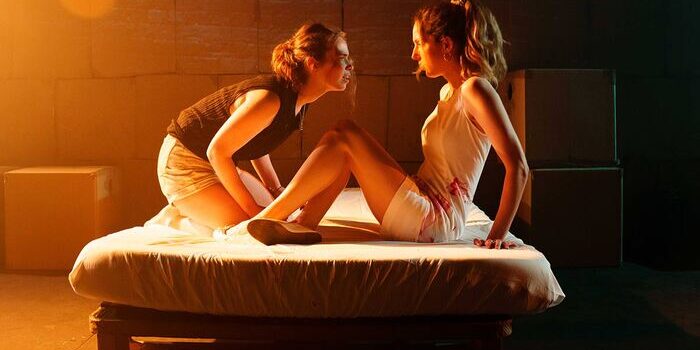Ella Dorman-Gajic’s debut play Trade, explores the European sex trafficking industry, told through the eyes of a young woman called Jana, played by British-Serbian actor Tanya Cubric. The two creatives come from distinctly different Serbian backgrounds – here they discuss prejudice, language, cultural identity and inspirational Balkan women.
EDG: Trade is a work of fiction, however, it is heavily influenced by many of the true-life experiences I had read about. I feel passionate about the prejudices and preconceptions people have of immigrants – and the hidden exploitation that goes on behind closed doors, which is not given near enough attention by our government.
Women are trafficked to the UK from all over the globe – a large proportion of these are women from the Balkans. The number of women and girls trafficked around the globe is only increasing.
However, the dramatic works I had seen exploring sex trafficking had the tendency to portray trafficked women as solely victims, as if the fact they are foreign and trafficked defined their entire identity. I felt this fed into a detrimental stereotype of foreign women, that can further dehumanise them. I wanted to turn this stereotype on its head and tell a story through the perspective of an intelligent, nuanced, and complex character to whom people could relate – who isn’t perfect, and who makes morally questionable choices, in order to survive.
Tanya, have you been cast in roles similar to this in the past? And what was your response to the script when you first read it?
TC: What really drew me to the script was the exploration of the ‘imperfect victim’. We see Jana become complicit within the trafficking organisation and transform her situation to make it work to her advantage as much as possible. I hadn’t come across this perspective before for a character who has been trafficked. Characters who have been trafficked in general yes I have definitely played a few…
So do you have any particular writing rituals or mantras that help you get in the zone?
EDG: I didn’t use to – I can be quite impatient, so when I used to get an idea in my head, I just wanted to get writing straight away. But more recently I’ve started using massive flip-chart paper, sticking it up on my wall and use it to plan, or at least to get all the ideas out in front of me, before I start writing. I find it really helps refine and streamline all the thoughts pinging around in my brain.
When writing some sections of Trade, I did draw upon my Deda’s experiences; he came to the UK as a refugee and had to work on a farm for 3 years until he was allowed to work in his chosen profession – he was a trained, experienced toolmaker. But even then, no employer believed he was skilled enough to employ him, due to his broken English. So he worked for two weeks for free just to prove himself. Because of my heritage, I am very aware of the ingrained biases immigrants face, and I appreciate how lucky I am not to face those negative biases myself.
This is something I wanted to explore in Trade, through the use of language; Jana speaks directly to the audience and to other Serbo-Bosnian-Croat speakers in a fluent, native tongue, but in the scenes with British men, she speaks in broken English, with a heavy accent. This exposes a dichotomy: the tough, eloquent Jana the audience see, in contrast with the ‘dim’, barely human version of Jana that these men treat her as – which is partly why it is so easy for them to objectify her. My aim was to challenge these biases – just because someone is not fluent in a language, it doesn’t make them any less intelligent – how many English people do you know who can speak another language? (Aside from yourself of course!). And yet, so many people in this country treat those who speak with an accent as lesser then.
My Deda was trying to get work in the early 50s, and although the world has progressed since then, I do believe some prejudices remain. Could you tell me about your Serbian roots?
TC: I think like all immigrants living in this country having an accent immediately marks you as a ‘foreigner’ so there are all sorts of unconscious and conscious biases that accompany that. There is a lot of work the UK, in particular, has to do to unlearn some of this… to start with… it would be great to see more accents on our screens and stage! To see more international theatre companies touring here! To see more stories that challenge the western gaze… My father’s side are Serbs from Lika and my mother’s side is from the south of Serbia and Montenegro.

Trade at Omnibus Theatre, London. Photo: Olivia Spencer
EDG: Yes – I couldn’t agree more. Half of Trade is set in London, and we really wanted to reflect London’s multiculturalism in the production – as you say – to challenge that ‘western gaze’. One way we did this was through the use of bilingual surtitles – the script was translated into Serbian by Zorica Agbaba and the captions were artistically integrated into our projection design by Timothy Kelly. Because this play has so many cultural references to Serbia, we really wanted to create something that was fully accessible to native Serbian speakers, as well as d/Deaf audiences, which also tied in creatively with the linguistic shifts within the play.
From my memories of my Deda, he was always speaking Serbian – it’s how he communicated with all his friends here. He was one of the founding members of the Serbian Orthodox church in Ladbroke Grove, where I was christened; my mum was brought up immersed in London’s Serbian diaspora. Because my Mum, auntie and uncle didn’t have extended family here, it was the Serbian immigrant community at church who became their family – their Kumovi are especially close, and definitely feel like family to us. I am a third-generation immigrant, and yet, Serbian culture was a profound part of my upbringing. I find it so moving and important how diaspora communities keep their country’s cultures alive, decades after leaving – Serbia has changed so much since my Deda left, yet the culture he brought with him to the UK hasn’t changed that much at all.
What impact has your Serbian heritage had on your upbringing? And has it influenced the work that you have made?
TC: I’m definitely still in the process of exploring this in both my personal life and work as a performer. It can be a confusing journey to have one foot firmly in one culture while growing up in a different one but also enriching at times for sure. I like to think this double culture upbringing helps one see different perspectives and feel solidarity with many other immigrants and minority communities.
EDG: The beginning of Trade is set against the backdrop of post-war former Yugoslavia. There is now a growing number of stories exploring the Yugoslavian wars. Part of me feels this is important, in order to raise awareness of a recent part of European history that is rarely explored in education or mainstream media. However, I do also appreciate that having too many stories like this can lead to regions, like former Yugoslavia, being defined by war and trauma, when there are a plethora of other diverse stories, people, and cultural practices from the Balkans that deserve to be celebrated, through art and storytelling.
As a second-generation Serbian immigrant, what stories about Serbia would you like to see?
TC: There are so many stories I would love to see! I would actually love to see more stories about second-generation immigrants, stories that explore the confusing double identity. Balkan and British values don’t always mix and narratives exploring these tensions would be interesting to me.
I am also mildly obsessed with Vesna Vulovic, a Serbian air hostess who holds the record for surviving the highest fall (10,160m fall) without a parachute. She became a national hero of Yugoslavia with songs being written about her but was vocal against the government during the war… they couldn’t imprison her because of her popularity with the people. I think she’s such a fascinating character and I am brewing an idea based on her story….
What about you? Are there other stories based in the Balkans / involving Balkan people that you want to write?
EDG: Wow, sounds like she was a phenomenal woman. Yes, definitely – I would also love to see more stories exploring that dual cultural identity. Our Slava was a big part of my upbringing, and we still attend friend’s Slavas in London. It is something that is so unique to the Serbian Orthodox religion, with so many traditions attached to it – the blessing of the Slava bread/cake, the zito. Although I wouldn’t say I am religious myself, these are traditions I treasure and they inform my sense of identity. This is definitely something I would love to explore in my work – the practice of keeping a country’s culture alive, outside of the country itself.
There have been so many incredible people who have come from the Balkans – you and I recently spoke about Mileva Marić, a Serbian physicist (and Einstein’s first wife) who, by many accounts, helped to co-write many of his articles including the theory of relativity! Her life sounds fascinating. Maga Magazinovic, the first woman to bring modern dance to Serbia and a massive advocate for gender equality plus the country’s first female journalist. And, of course, household names like Marina Abramović. I also really admire the work of Bosnian screenwriter and filmmaker Jasmila Žbanić whose films explore the war in Bosnia, from the female perspective.
When so much pain and trauma have impacted a region, it can be eclipsed by it. But there have been so many incredible women from the Balkans, as well as women who have suffered as a result of the wars and their aftermath. In my work and my life, I am always inspired by complex, multifaceted women, and their responses in the face of adversity – which is what I wanted to explore in Trade, and it is what drives me to continue telling stories about women, especially ones that are under-explored in mainstream narratives.
Further reading: The Ghosts on Your Shoulder – Igor Memic and Miran Hadzic in conversation
Unmapping Theater: German theatre and its attitude towards the ‘East’









